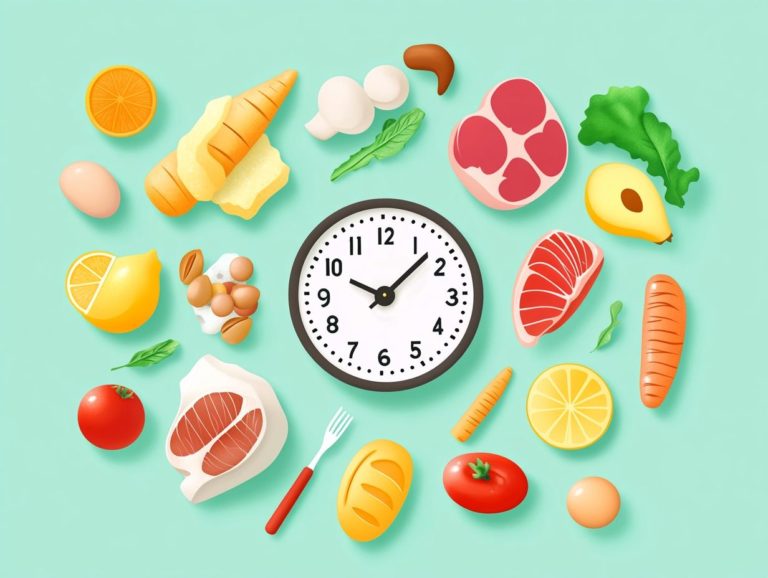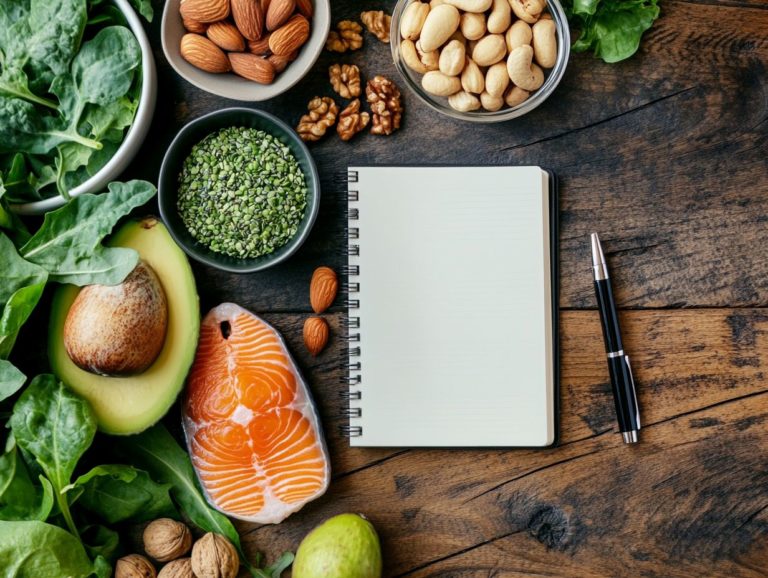Can I Eat Fruits on Keto? Your Questions Answered
Contents
- Can You Eat Fruits on the Keto Diet?
- Key Takeaways:
- What Is the Keto Diet?
- Can I Eat Fruits on Keto?
- Why Eating Fruits on Keto Is Beneficial
- Offers Natural Sources of Fiber
- Can Help with Cravings for Sweets
- What Are the Risks of Eating Fruits on the Keto Diet?
- Key Takeaways
- May Cause a Spike in Blood Sugar Levels
- How Can I Incorporate Fruits into My Keto Diet?
- Choose Low-Carb Fruits
- Limit Portion Sizes
- Pair Fruits with High-Fat Foods
- Track Your Intake
- Frequently Asked Questions
- Can I Eat Fruits on Keto?
- Which Fruits are Allowed on a Keto Diet?
- How Much Fruit Can I Eat on a Keto Diet?
- Can I Eat Fruits on Keto if I Want to Lose Weight?
- Are There Any Fruits I Should Avoid on a Keto Diet?
- Can I Eat Dried Fruits on a Keto Diet?
Can You Eat Fruits on the Keto Diet?
The keto diet is known for its low-carb and high-fat approach. Many wonder about the role of fruits in their meals and whether they can enjoy them without affecting progress.
This article will explore the basics of the keto diet. You’ll learn which fruits fit into your keto goals and the benefits and risks of including them in your meal plan.
Join us on this journey to discover how to enjoy fruits while thriving on your keto lifestyle!
Key Takeaways:
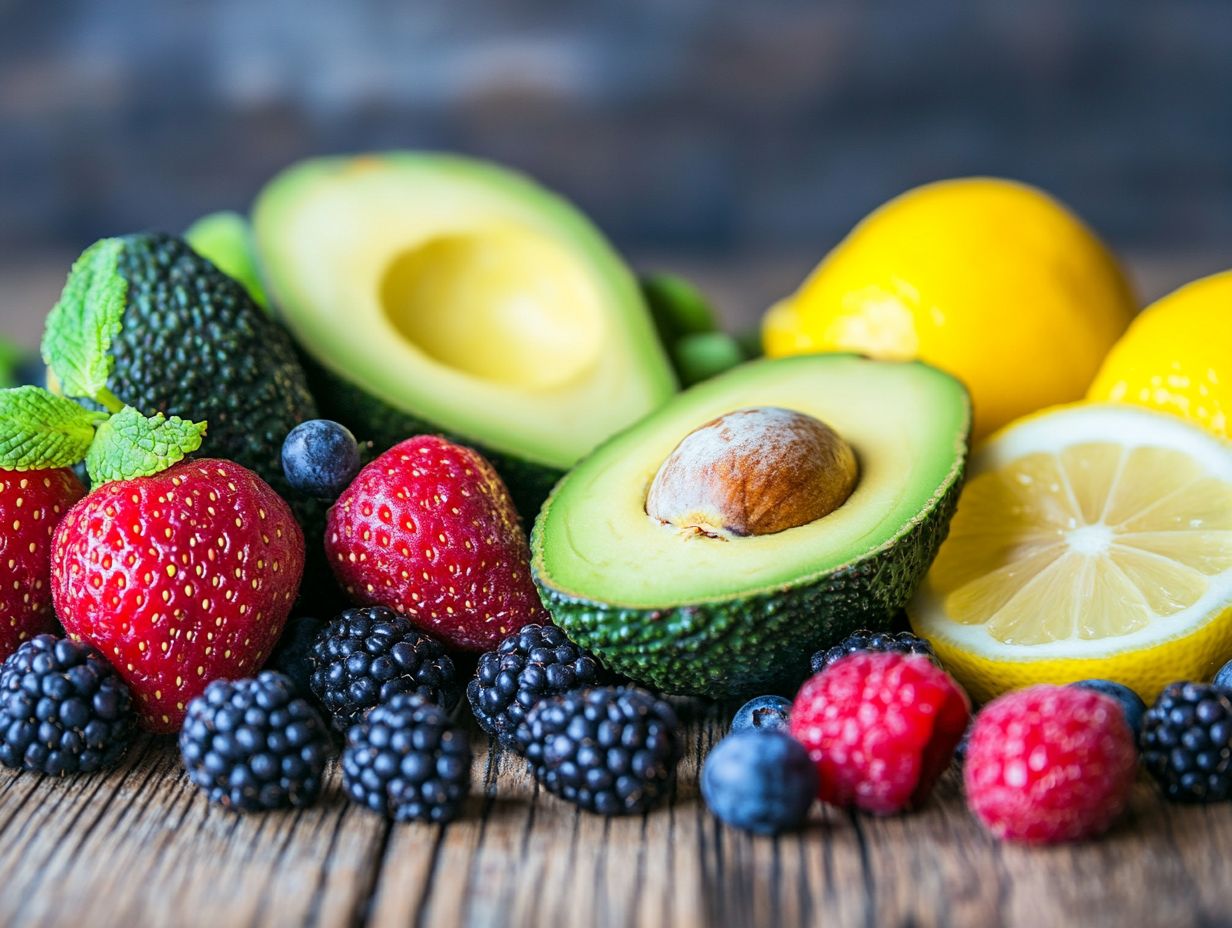
- You can eat fruits on the keto diet, but limit certain types.
- Fruits provide nutrients and fiber, but too much can spike blood sugar and hinder weight loss.
- Choose low-carb fruits, limit portions, and pair them with high-fat foods to maintain ketosis.
What Is the Keto Diet?
The keto diet is a sophisticated low-carb, high-fat regimen crafted to induce ketosis a natural metabolic state where your body burns fat for energy instead of carbohydrates. This diet isn’t just a trend; it’s designed to support various health goals, from weight loss to enhanced insulin sensitivity and the management of type 1 diabetes and type 2 diabetes.
To reap the benefits, you must thoughtfully select your foods, keeping net carbs low while ensuring you consume enough healthy fats. This approach is especially pertinent for those managing conditions like type 1 and type 2 diabetes, as highlighted by experts such as Deborah Malkoff-Cohen from the Harvard T.H. Chan School of Public Health and Tori Schmitt from YES! Nutrition.
What Are the Main Principles of the Keto Diet?
The fundamental principles of the keto diet center on significantly reducing your carbohydrate intake while increasing the consumption of healthy fats. This shift facilitates your body’s transition into a state of ketosis, where fat becomes your primary energy source instead of glucose.
By following these guidelines, you not only elevate your energy levels but also support effective weight management. Healthy fats think avocados, nuts, and olive oil not only provide essential nutrients but also promote a sense of fullness, which can help you resist those tempting snacks.
Limiting net carbs total carbohydrates minus fiber creates a metabolic environment that encourages your body to burn fat for fuel. For instance, incorporating leafy greens, cruciferous vegetables, and low-sugar berries ensures that you maintain nutrient density while keeping carb counts in check.
Experts advocate that this strategic combination optimizes your energy levels and enhances fat utilization, reinforcing the balance and sustainability of the ketogenic approach on your weight loss journey.
Can I Eat Fruits on Keto?
Absolutely, you can enjoy fruits on the keto diet, but it s crucial to make informed choices. Focus on low-carb fruits that align with your daily net carb limit, ensuring you still receive essential nutrients while effectively supporting your weight loss objectives.
What Fruits Are Allowed on the Keto Diet?
On the keto diet, you can indulge in a variety of low-carb fruits, including avocados, raspberries, lemons, blackberries, tomatoes, rhubarb, star fruit, strawberries, and watermelon. Each of these fruits offers unique health benefits while keeping net carbs impressively low.
These fruits add delightful flavors to your meals and deliver essential nutrients that support your overall health.
Take avocados, for instance. They re a powerhouse of healthy fats, providing only about 2 grams of net carbs per 100 grams while supplying a generous amount of potassium and vitamin E.
Raspberries are another excellent choice, containing approximately 5 grams of net carbs. They are loaded with antioxidants and dietary fiber, both of which aid digestion and promote a satisfying feeling of fullness.
Don t overlook lemons; they bring a refreshing zest to your dishes and have about 3 grams of net carbs, along with valuable vitamin C to bolster your immune system.
Incorporating these fruits into your diet keeps your taste buds happy while helping maintain ketosis by offering important vitamins and minerals without exceeding your carb limits.
What Fruits Should Be Avoided on the Keto Diet?
While the keto diet allows certain low-carb fruits, avoid high-carb fruits to stay on track with your keto goals! These fruits can disrupt your journey into and maintenance of ketosis, which is essential for effective weight loss.
Common high-carb culprits include bananas, grapes, and apples. These fruits pack enough sugars to easily push you over the daily carb limits of a ketogenic lifestyle. Just a single serving of these fruits can jeopardize your weight loss goals, as your body may switch back to burning glucose instead of fat.
Therefore, it s crucial to approach fruit consumption with utmost caution, as advised by MedlinePlus.
Why Eating Fruits on Keto Is Beneficial
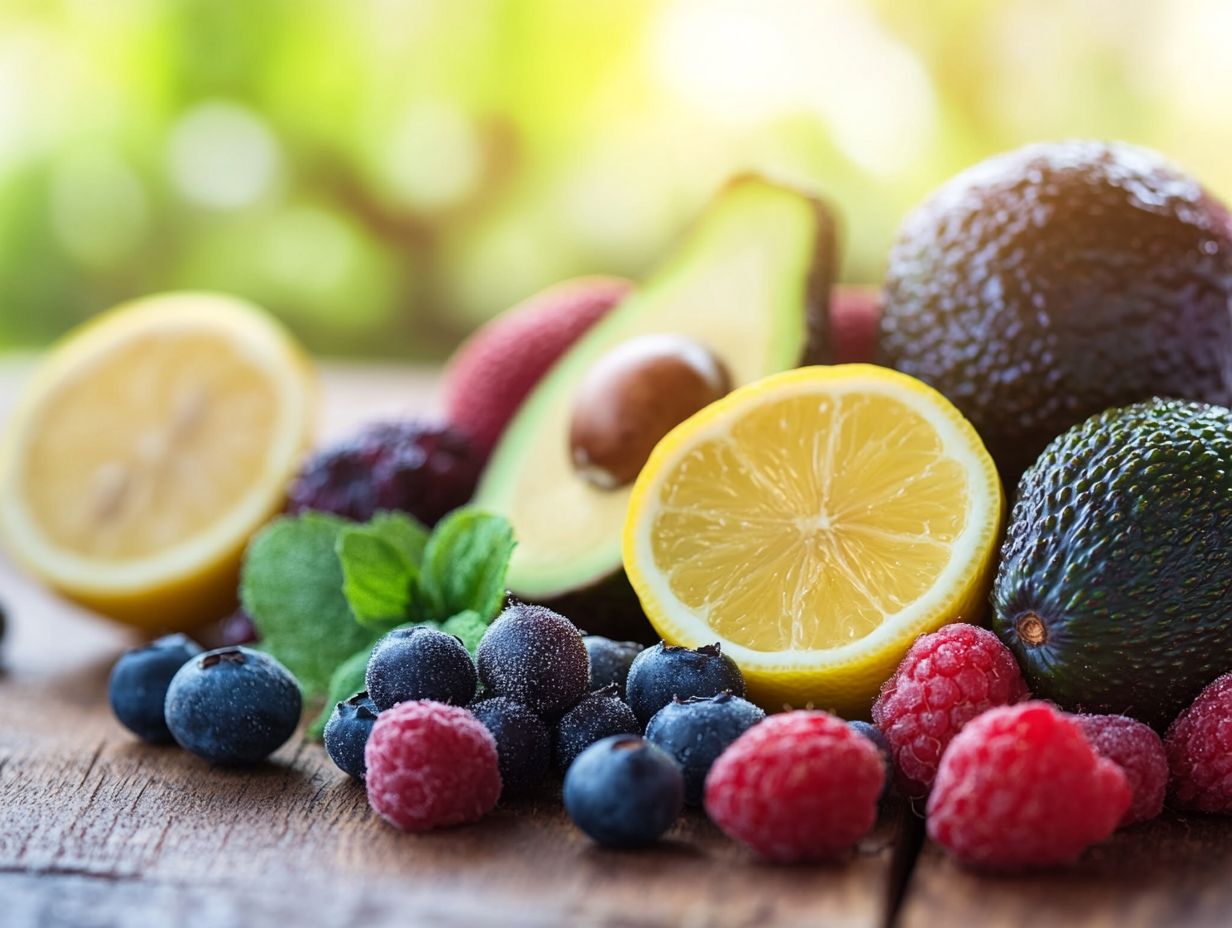
Incorporating fruits into your keto diet can provide a range of benefits that enhance your overall health. These natural delights offer essential vitamins and minerals that support your body s functions while serving as excellent sources of fiber.
Fruits can also help manage cravings for sweets, contributing positively to a balanced and satisfying dietary experience.
Provides Essential Vitamins and Minerals
Fruits like avocados, strawberries, and blackberries are not just delicious; they re also packed with essential vitamins and minerals, particularly potassium and vitamin C. These nutrients help support your overall health while staying true to keto dietary guidelines, as noted by the U.S. Department of Agriculture.
Potassium is vital for anyone on a low-carb journey it helps keep your body’s fluids balanced, which can significantly reduce the risk of pesky muscle cramps and fatigue that often accompany the early days of keto adaptation.
Vitamin C is a powerhouse for your immune system and crucial for collagen production, enhancing skin health and aiding in wound healing.
By incorporating these fruits into your daily meals, you can effortlessly meet your nutritional needs without tipping over your carbohydrate limits. This ensures you enjoy sustained energy throughout the day. Plus, the fiber in these fruits supports digestion, making it easier for you to stick to the dietary restrictions that often come with a ketogenic lifestyle, as recommended by the Cleveland Clinic and Harvard Health Publishing.
Offers Natural Sources of Fiber
Fruits serve as a natural source of fiber, essential for digestion and overall health. They are a valuable addition to your keto diet without jeopardizing your weight loss efforts.
Incorporating fiber-rich fruits into your meals facilitates smooth digestion and helps you maintain a sense of fullness between meals. This strategy is particularly advantageous for those embracing a ketogenic lifestyle. These nutritious options, while low in carbohydrates, provide essential vitamins and antioxidants that bolster your overall wellness.
By choosing fruits that are lower in sugar, such as watermelon or star fruit, you can effectively manage your fiber intake while staying aligned with your diet goals.
This balance is crucial for promoting a healthy digestive system and sustaining your energy levels, ultimately supporting the primary goals of the keto diet, as exemplified by popular programs like Atkins.
Can Help with Cravings for Sweets
Incorporating low-carb fruits into your keto diet can be a game-changer for satisfying sweet cravings. This allows you to stick to your dietary restrictions while still indulging in delicious options.
Fruits like berries, melons, and avocados are low in carbohydrates and packed with fiber. This promotes a sense of fullness that helps you feel satisfied longer. By choosing these natural snacks, you can elegantly sidestep high-sugar desserts that spike blood sugar levels and contribute to unwanted weight gain.
Instead of reaching for that candy bar or sugary treat, opting for fresh fruit will appease your sweet tooth and keep you on track with your weight loss goals. This strategy curbs your cravings while ensuring your body receives essential vitamins and minerals. It s a winning approach to maintaining a healthy and enjoyable keto lifestyle.
What Are the Risks of Eating Fruits on the Keto Diet?
While fruits provide numerous benefits on the keto diet, be cautious of the risks, particularly the potential for overindulging in carbs. This overconsumption can hinder your body s ability to maintain ketosis, which is crucial for achieving results on your keto journey.
Can Lead to Overconsumption of Carbohydrates
One significant risk is the potential for overconsumption of carbohydrates when enjoying fruits on the keto diet. This can derail your weight loss efforts and disrupt your state of ketosis.
Many might not realize just how quickly the carb content and net carbs can accumulate when indulging in fruits, especially the naturally sweet varieties. While fruits are generally healthy, their sugar content can create challenges for anyone striving to maintain a strict ketogenic lifestyle.
Even small portions can inadvertently push you over your daily carb limits. It s crucial to be mindful of both the serving sizes and the types of fruits you choose, especially if you’re managing conditions like type 1 diabetes or type 2 diabetes.
To savor fruit without compromising your carb intake, consider incorporating low-sugar options like berries, avocados, and olives. Track your carb grams, choose whole fruits over juices, and pair fruits with healthy fats like nuts or cream to maintain satisfaction while minimizing carbohydrate spikes.
Establishing a fruit rotation schedule can ensure you enjoy diverse nutrients without overwhelming your carb counts. This allows you to relish the occasional fruity treat while keeping your dietary goals firmly in sight.
Key Takeaways
- Fruits can be a part of a keto diet if chosen wisely.
- Mind your serving sizes to avoid excessive carbohydrate intake.
- Low-sugar fruits like berries and avocados are preferable.
- Pair fruits with healthy fats to enhance satisfaction.
In conclusion, while fruits can provide valuable nutrients and help manage cravings on a keto diet, it is essential to be aware of the associated risks. By making informed choices, you can enjoy the benefits of fruits while staying on track with your dietary goals.
May Cause a Spike in Blood Sugar Levels
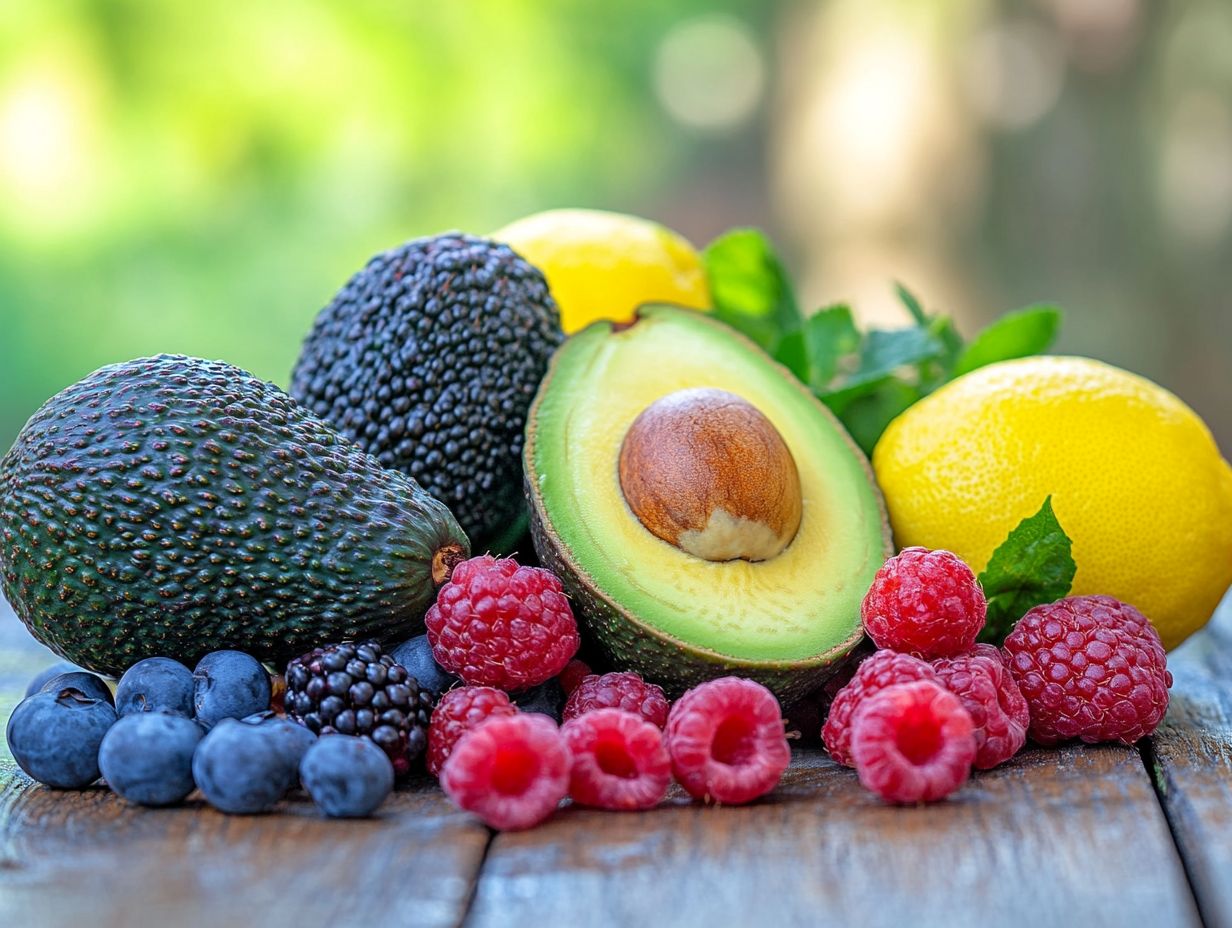
Certain fruits, particularly those with higher sugar content, can lead to spikes in your blood sugar levels. Keep this in mind to make the most of your keto journey!
While fruits are undoubtedly rich in essential vitamins and minerals, the selections you make can greatly influence your overall health. If you want to savor the joys of fruit without risking elevated glucose levels, it s wise to gravitate toward lower-sugar options like:
- Berries: These are packed with antioxidants and are generally low in sugar.
- Lemons: A great source of vitamin C and very low in carbohydrates.
- Avocados: Full of healthy fats and very low in sugar.
These fruits not only provide a healthy dose of fiber content to aid digestion, but they also boast a lower glycemic index, which is a measure of how quickly a food raises blood sugar levels. On the flip side, fruits such as:
- Bananas: High in sugar and should be eaten sparingly.
- Grapes: Delicious but can lead to spikes in blood sugar.
- Mangoes: Sweet and juicy but high in carbohydrates.
While undeniably delicious, these should be indulged in sparingly, as they can trigger those unwanted blood sugar spikes. By making thoughtful choices, you can relish the benefits of fruits while successfully adhering to a ketogenic lifestyle.
How Can I Incorporate Fruits into My Keto Diet?
Incorporating fruits into your keto diet demands careful planning. Focus on selecting low-carb options, track your portion sizes carefully, and consider pairing them with healthy fats.
This approach will not only help you maintain balance but also enhance your overall meal experience, making it both satisfying and enjoyable.
Choose Low-Carb Fruits
When you’re incorporating fruits into your keto diet, opting for low-carb choices like avocados, strawberries, and blackberries is essential. These fruits provide delightful flavor and essential nutrients without significantly impacting your carbohydrate intake.
Not only do these fruits elevate the taste of your dishes, but they also come packed with numerous health benefits, making them perfect for anyone looking to maintain ketosis while supporting weight loss. Take avocados, for example; they’re rich in healthy fats and can be effortlessly blended into smoothies or spread on low-carb bread for a satisfying breakfast.
Tomatoes are another versatile option that can be added to salads or used in sauces to enhance flavor without adding too many carbs.
Strawberries, with their vibrant hues and natural sweetness, are perfect for snacking, adding to salads, or serving as a topping for keto-friendly yogurt. And let s not forget about blackberries these little powerhouses are loaded with antioxidants and can be sprinkled over chia pudding or transformed into a refreshing sauce for grilled meats.
By thoughtfully incorporating these low-carb fruits into your meals, you can indulge in the deliciousness of fruit while staying fully aligned with your dietary goals.
Limit Portion Sizes
Limiting portion sizes of fruits is essential on the keto diet to keep your carbohydrate intake within daily limits and effectively achieve your weight loss goals.
By measuring your servings carefully, you can savor the natural sweetness of fruits without going overboard. Measure servings with measuring cups or a digital scale for precise portions, which is key to maintaining ketosis.
Consider incorporating fruit as a complementary element in your dishes think of it as a garnish or a flavorful accent rather than letting it steal the spotlight. For example, a handful of berries can elevate a rich coconut cream dessert, adding a delightful burst of flavor while keeping your carbohydrate levels stable.
Additionally, fruits like rhubarb and star fruit can add unique flavors and keep your net carbs in check. Implementing strategies like these ensures that your meals remain satisfying while staying true to keto principles.
Pair Fruits with High-Fat Foods
Enjoy fruits by pairing them with high-fat foods for a delicious twist that elevates the flavor and nutritional profile of your meals while perfectly aligning with your keto dietary goals. This approach allows you to enjoy fruits in a balanced way.
Consider the delightful combination of creamy avocado with tangy berries; not only does this create a wonderful contrast, but it also delivers a rich source of healthy fats and antioxidants. Similarly, think about pairing nuts with sliced apples or pears for that satisfying crunch, providing you with the protein and fiber necessary to keep hunger at bay.
These strategic combinations enhance your enjoyment of these foods while helping you maintain steady energy levels throughout the day. By incorporating these pairings into your keto diet, you can indulge in the natural sweetness and nutritional benefits of fruits without veering off your dietary path. Adding fruits like lemons and raspberries can also boost your intake of vitamin C and potassium.
Track Your Intake
Tracking your fruit intake is essential on the keto diet. It ensures you remain within your daily carbohydrate limits while effectively managing your weight loss journey and avoiding issues like the keto flu (a temporary illness that some people experience when starting a keto diet).
Using tools like smartphone apps or food logs can greatly assist you in monitoring your carb consumption and incorporating the right types of fruits into your meals. Many popular applications allow you to scan barcodes or manually enter food items, making tracking nutrients a breeze. Keeping a physical log enhances accountability, helping you see how your choices align with your keto goals.
When you keep track of what you eat, you can savor fruits in moderation without jeopardizing your state of ketosis, striking a harmonious balance between enjoyment and dietary discipline.
Frequently Asked Questions
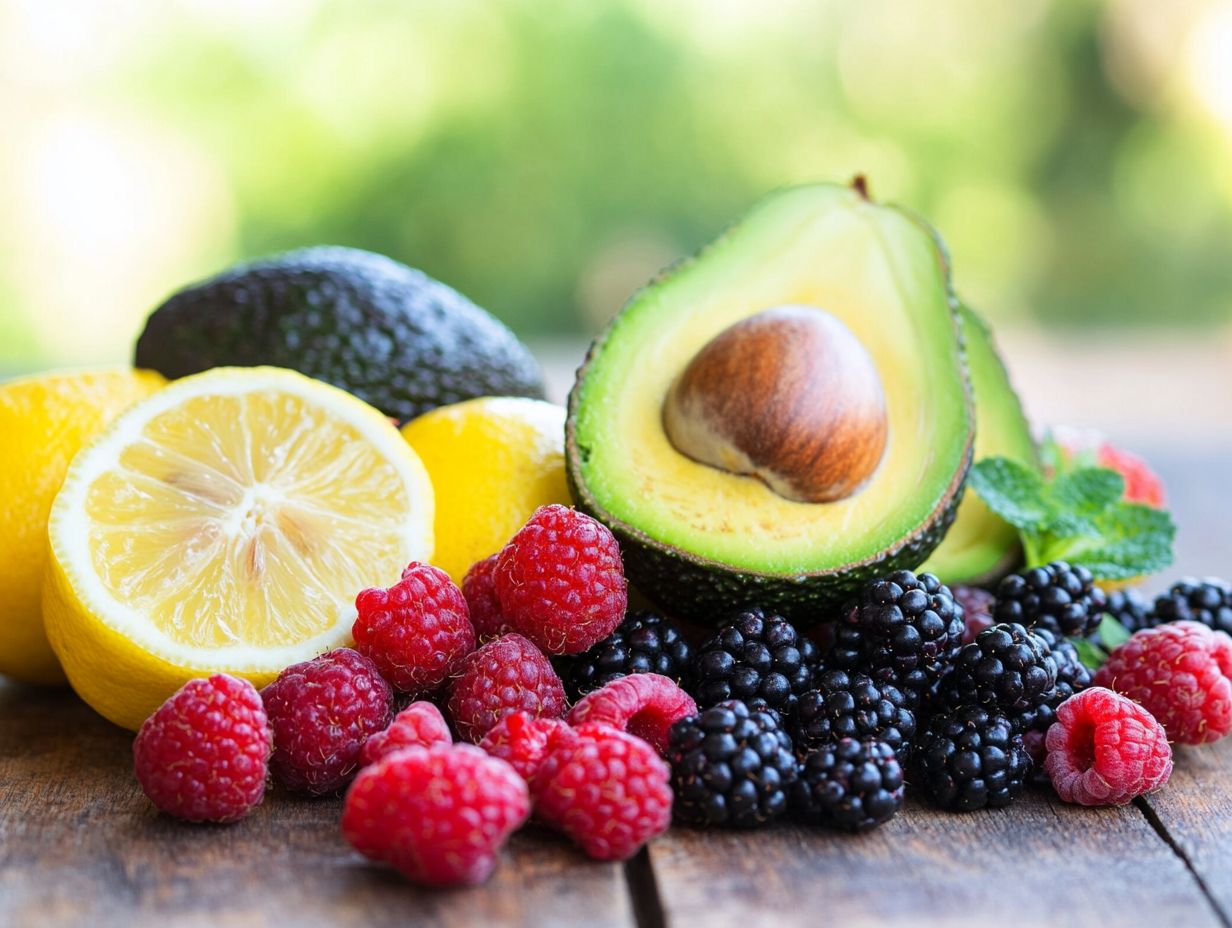
Can I Eat Fruits on Keto?
Yes, you can eat some fruits on a keto diet, but it is important to choose low-carb options and monitor your portion sizes. Experts like Deborah Malkoff-Cohen and Tori Schmitt from YES! Nutrition recommend focusing on low-carb fruits to stay within your carb limits.
Which Fruits are Allowed on a Keto Diet?
- Berries such as strawberries, blueberries, and raspberries are the best options for a keto diet, as they are low in carbs and high in fiber.
- Avocados and olives are also considered keto-friendly fruits.
How Much Fruit Can I Eat on a Keto Diet?
The amount of fruit you can eat on a keto diet depends on your individual carb limit. It is recommended to stick to one serving of fruit per day, typically around 1/4 cup of berries or 1/2 a small avocado.
Can I Eat Fruits on Keto if I Want to Lose Weight?
Yes, you can still lose weight while incorporating fruits into your keto diet. However, it is important to keep track of your overall calorie and carb intake to ensure you are in a caloric deficit.
Are There Any Fruits I Should Avoid on a Keto Diet?
Yes, there are some fruits that are high in carbs and should be avoided on a keto diet, such as bananas, grapes, and mangoes. These fruits are high in natural sugars and can easily kick you out of ketosis.
Can I Eat Dried Fruits on a Keto Diet?
Dried fruits are not recommended on a keto diet, as they are much higher in sugar and carbs compared to fresh fruits. They also lack the water content that helps keep you full, making it easy to overeat and consume too many carbs.
If you have more questions about fruits on a keto diet, feel free to ask! Your journey towards a balanced keto lifestyle is important.


